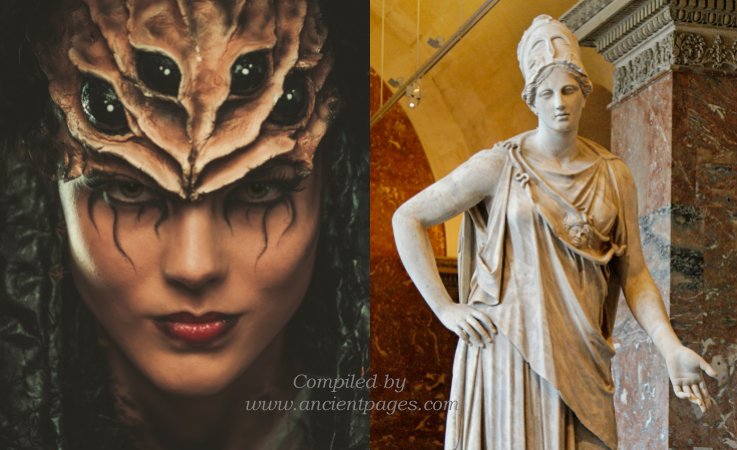Athena – Goddess Of Wisdom Delivered Punishments And Gifts
Ellen Lloyd - AncientPages.com - Athena was an intriguing goddess in Greek mythology. Famous for her wisdom and braveness, she became the favorite child of god Zeus. As her name implies, she was closely related to the capital of Greece. It was long unknown whether Athena was named after Athens or Athens after Athena. Today, most scholars agree that the goddess Athena took her name from the city.
Athena’s Punishments
In Greek mythology, gods and goddess often reveal their weaknesses and strengths. The Greek deities have many human characteristics. Their divine nature doesn’t stop them from being angry, jealous, passionate, or full of hatred. Gods and goddesses often compete against each other. Many Greek myths revolve around vengeance and love.
One would think that Athena’s wisdom would prevent her from getting involved in emotional conflicts, but stories show she was no different than the other Greek deities in that respect. She could punish another deity or human for just being better at something. As previously discussed on Ancient Pages, one example of her envy was demonstrated when she participated in a weaving contest with Arachne, a mortal, young woman whom Athena transformed into a spider.
Left: Arachne as a spider woman. Stock photo - Right: Athena, Goddess of wisdom, handicraft, and warfare. Credit: Public Domain
There are different versions of the story. According to one version, Athena lost the contest. Another version tells that Zeus was the judge, and Athena won the weaving contest. So, it’s unclear whether Athena transformed Arachne into a spider simply because the young girl was a better weaver or because she felt sorry for her.
Another incident that reveals Athena’s anger and desire to punish involves Medusa. In Greek mythology, Medusa is a hideous gorgon, a winged female creature having a head of hair consisting of snakes. However, Medusa was originally a beautiful maiden who Poseidon raped in Athena’s temple. The goddess Athena was not happy about this behavior and cursed Medusa. Her beautiful hair was changed to that of a head full of snakes. Her features also changed and were so ugly that whoever looked at her face was turned into stone.
Tiresias, the unusual prophet who turned into a woman for seven years, may also have been punished by Athena. Tiresias was not blind from the beginning, and several stories describe how he lost his eyesight. Some think the gods blinded him for revealing their secrets, but there are also other suggestions.
According to poet Pherecydes, Tiresias once stumbled upon Athena while she was bathing in a lake. Unable to take his eyes away from the beautiful goddess, Tiresias was punished by Athena, and he became blind.
Aulos – Athena’s Gift To Humans
Pindar (522 – 443 B.C.), a Greek lyric poet from Thebes, wrote in his Twelfth Pythian Ode that the goddess Athena invented the aulos. It’s a double-reeded musical instrument that is often mistaken for a flute, but it was more like the modern oboe and its sounds reminded of bagpipes. The aulos can be admired in many ancient depictions discovered by archaeologists.
Owl Of Athena – A Symbol Of The Goddess Of Wisdom
Renowned for her wisdom, Athena became associated with the owl, which became her symbol.
Silver tetradrachm coin at the Museum of Fine Arts of Lyon depicting the owl of Athena (circa 480–420 BC). Image credit: Public Domain, CC BY 2.5
According to Walsh Nicos, Athena “was considered the goddess of inspiration, courage, wisdom, strategic war, mathematics, arts, crafts, and other academic talents. She was always known to be a shrewd and cunning companion to many heroes as they went on dangerous quests. The wisest bird of them all, the owl, was Athena’s sacred animal.”
However, owls were not always used to represent Athena. Sometimes, they served as motivation during battles with other Greek cities. The flying bird was regarded as Athena’s blessing. She was a great goddess of warfare who was believed to have aided the heroes Perseus, Heracles, Bellerophon, and Jason.
Athena And Hephaestus, The God Of Fire
Hephaestus was the God of fire and master of craftsmanship. He was famous for constructing Talos, the first Greek robot and many divine weapons frequently used by the gods.
Hephaestus was in love with Athena and asked Zeus for permission to marry his daughter. Zeus agreed, but only if it was Athena’s wish. Athena, one of the three great "virgin goddesses" of Olympus, the other two being Artemis and Hestia, wanted to remain a virgin and refused to marry the God of Fire.
Athena scorning the advances of Hephaestus (c. 1555-1560) by Paris Bordone, Museum of Art and Archaeology, University of Missouri. Image credit: Public Domain
Hephaestus tried to rape her unsuccessfully. She pushed him away, and his semen touched the Earth and impregnated Gaia, the Goddess of Earth who bore a son Erichthonius. Athena felt responsible for the child. She wanted to raise him secretly and placed the child in a box. When Erichthonius was older, he became a legendary early ruler of ancient Athens.
Athena Competed With Poseidon For The Patronage Of Athens
Athena won the right to be worshipped as the goddess of Athens when she offered people a better gift than Poseidon. According to a foundation myth, there was a competition between Athena and Poseidon, and both were asked to give the Athenians one gift. One myth tells that Poseidon struck the ground with his trident so that a spring of water sprung up. This gave people access to water and trade. However, the water was salty and undrinkable. Another myth informs that Poseidon offered the citizens of Athens a horse.
Athena offered the first domesticated olive tree. Cecrops, the founder and the first king of Athens, was the judge of the competition, and he declared that Athena’s gift was most valuable, so she became the patron goddess of Athens. The olive tree became a symbol of Athenian economic prosperity. Today, the olive tree grows in abundance all over Greece, and Greeks consume more olive oil than anybody else worldwide.
It seems that Athena’s popularity has not diminished much since ancient times. She has captured the hearts of many modern artists and writers who, through their works, have kept her memory alive.
Written by Ellen Lloyd – AncientPages.com
Updated on January 5, 2024
Copyright © AncientPages.com All rights reserved. This material may not be published, broadcast, rewritten or redistributed in whole or part without the express written permission of AncientPages.com
Expand for referencesMore From Ancient Pages
-
 Ancient DNA Pushes Herring Trade Back To The Viking Age
Archaeology | Oct 26, 2022
Ancient DNA Pushes Herring Trade Back To The Viking Age
Archaeology | Oct 26, 2022 -
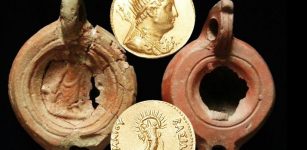 Greco-Roman Bath Complex, Coin Depicting King Ptolemy III And Other Artifacts Found In Egypt’s Gharbia Province
Archaeology | May 26, 2018
Greco-Roman Bath Complex, Coin Depicting King Ptolemy III And Other Artifacts Found In Egypt’s Gharbia Province
Archaeology | May 26, 2018 -
 UK’s Oldest Human DNA Reveals Two Genetically Distinct Human Groups Migrated To Britain At The End Of Last Ice Age
Archaeology | Oct 24, 2022
UK’s Oldest Human DNA Reveals Two Genetically Distinct Human Groups Migrated To Britain At The End Of Last Ice Age
Archaeology | Oct 24, 2022 -
 Mysterious Megalithic Stones Of Carnac, France – An Unsolved Neolithic Enigma
Civilizations | Oct 12, 2018
Mysterious Megalithic Stones Of Carnac, France – An Unsolved Neolithic Enigma
Civilizations | Oct 12, 2018 -
 Taíno Indians Are Not Extinct – Ancient Tooth Reveals Indigenous Americans Still Have Living Descendants In The Caribbean
Archaeology | Feb 21, 2018
Taíno Indians Are Not Extinct – Ancient Tooth Reveals Indigenous Americans Still Have Living Descendants In The Caribbean
Archaeology | Feb 21, 2018 -
 Stunning Ancient Roman Artifacts And Three Shipwrecks Discovered Underwater Off The Coast Off Alexandria, Egypt
Archaeology | Nov 26, 2017
Stunning Ancient Roman Artifacts And Three Shipwrecks Discovered Underwater Off The Coast Off Alexandria, Egypt
Archaeology | Nov 26, 2017 -
 On This Day In History: Battle Of Pinkie Was Fought – On September 10, 1547
News | Sep 10, 2016
On This Day In History: Battle Of Pinkie Was Fought – On September 10, 1547
News | Sep 10, 2016 -
 Coral Castle Is Among Most Fascinating And Mysterious Buildings In Florida
Featured Stories | Sep 17, 2018
Coral Castle Is Among Most Fascinating And Mysterious Buildings In Florida
Featured Stories | Sep 17, 2018 -
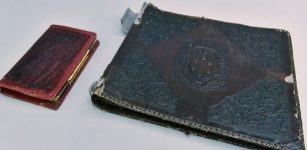 Nazi Photo Album Made Of Human Skin Found At Polish Antiques Market
History | Mar 18, 2020
Nazi Photo Album Made Of Human Skin Found At Polish Antiques Market
History | Mar 18, 2020 -
 Indigenous People Of Ancient Sicily Were Acrive Traders Long Before The Greeks Arrived
Archaeology | Sep 28, 2021
Indigenous People Of Ancient Sicily Were Acrive Traders Long Before The Greeks Arrived
Archaeology | Sep 28, 2021 -
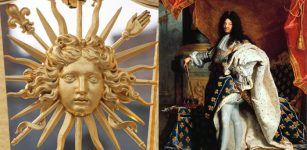 Why Was Louis XIV Called The Sun King?
Ancient History Facts | Jul 11, 2019
Why Was Louis XIV Called The Sun King?
Ancient History Facts | Jul 11, 2019 -
 Rocket Launch Into Space At Sibiu, Romania Took Place In 1555 – Sibiu Manuscript
Ancient Mysteries | May 29, 2014
Rocket Launch Into Space At Sibiu, Romania Took Place In 1555 – Sibiu Manuscript
Ancient Mysteries | May 29, 2014 -
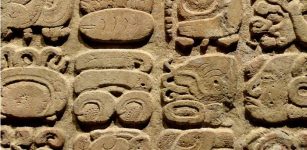 On This Day In History: Spanish Priest Diego de Landa Burned The Sacred Books Of Maya – On July 12, 1562
News | Jul 12, 2016
On This Day In History: Spanish Priest Diego de Landa Burned The Sacred Books Of Maya – On July 12, 1562
News | Jul 12, 2016 -
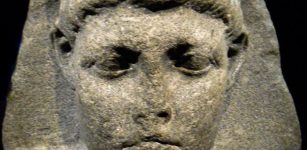 ‘Little Caesar’: Forgotten ‘King Of Kings’ Who Died Very Young
Featured Stories | May 11, 2020
‘Little Caesar’: Forgotten ‘King Of Kings’ Who Died Very Young
Featured Stories | May 11, 2020 -
 Ancient DNA Reveals A Diverse Community Lived At Machu Picchu, The ‘Lost City Of The Incas’
Archaeology | Jul 26, 2023
Ancient DNA Reveals A Diverse Community Lived At Machu Picchu, The ‘Lost City Of The Incas’
Archaeology | Jul 26, 2023 -
 Mysterious 2,000-Year-Old Disco Colgante – Unknown High-Tech Device, Representation Of A Spiral Galaxy Or Something Else?
Artifacts | Nov 20, 2020
Mysterious 2,000-Year-Old Disco Colgante – Unknown High-Tech Device, Representation Of A Spiral Galaxy Or Something Else?
Artifacts | Nov 20, 2020 -
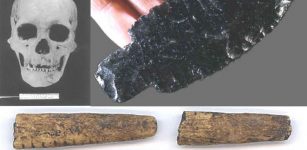 Buhl Woman Of Idaho: One Of The Oldest Skeletons In North America
Civilizations | Jun 3, 2023
Buhl Woman Of Idaho: One Of The Oldest Skeletons In North America
Civilizations | Jun 3, 2023 -
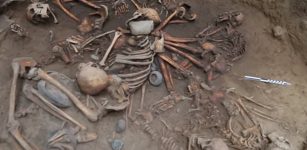 Linked Human Skeletons Lying In Spiral Circle Unearthed In Pre-Aztec Burial Pit Near Mexico City
Archaeology | Feb 7, 2018
Linked Human Skeletons Lying In Spiral Circle Unearthed In Pre-Aztec Burial Pit Near Mexico City
Archaeology | Feb 7, 2018 -
 What Was The Extreme Ritual Of Sokushinbutsu?
Ancient Traditions And Customs | Jun 20, 2018
What Was The Extreme Ritual Of Sokushinbutsu?
Ancient Traditions And Customs | Jun 20, 2018 -
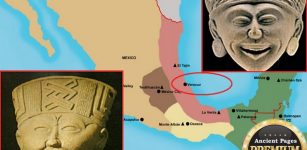 Curious Pre-Columbian Clay Figurines With Smiling Faces From Veracruz
Ancient Mysteries | Jan 29, 2018
Curious Pre-Columbian Clay Figurines With Smiling Faces From Veracruz
Ancient Mysteries | Jan 29, 2018


